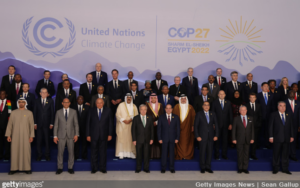We Have a Problem: Just 7 of the 110 Leaders at the UN Climate Conference Were Women
It’s been about a month since the United Nations climate conference began in Egypt. Called COP27, the annual forum was a chance to address an increasingly clear red alert for our planet. But part of addressing the physical changes to the climate includes the consideration of who global warming is affecting most, where, and how. That means looking at economic, racial, and gender disparities globally, and tackling them one by one. And a post-mortem look at representation at the conference reveals abysmal discrepancies.
Women composed less than 34 percent of the negotiating teams from all countries, despite being one of the most affected groups from climate change in the world. In a photo of all the world leaders at the summit, only seven of the 110 leaders were women. Seven.
And while there has been an increased presence of women overall at the yearly UN climate conference — a rise in both presence and participation at high levels, according to WEDO, a women’s environmental rights organization based in New York, this year’s conference was a far cry from the highest level, which was 40 percent participation in 2018.
At the 2011 meeting, countries had pledged to increase the participation of women, the BBC reported.
As for the overall increase in participation over the years, WEDO writes: “This long-term progress can be attributed to various factors: the adoption of decisions promoting women’s participation in climate change mitigation and adaptation efforts at the UNFCCC [the United Nations Framework Convention on Climate Change], the implementation of gender quotas and the introduction of climate change and gender plans at the national level, as well as the introduction of initiatives by civil society to enhance women’s leadership in climate change negotiations.”
However, in recent years, the organization found that “that progress is inconsistent and, in some areas, stalled.”
